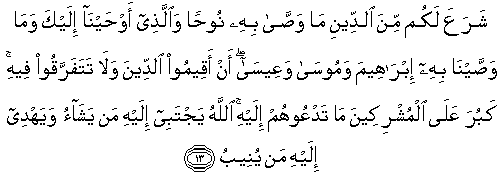I will discuss tawheed of Allaah with regard to worship (Tawheedul-Uloohiyyah) and its importance because of two reasons:
Firstly, that it is the most important part of the call of the Messengers presented to us in the Qur'aan, and because it was the reason for the continual struggle between them and their enemies, the proud and haughty, and the obstinate, in every nation. It has continued as the reason for conflict until this day, and perhaps it will continue as such until the Day of Resurrection, as a trial and test for the inheritors of the Messengers, and in order to raise their station.
Secondly, the most severe and dangerous deviation afflicting the Muslims in the east and the west is with regard to it, and this affects the majority of the ignorant amongst the Muslims and many of those who are educated and those who associate themselves with knowledge. So we will begin by presenting the calls of the Prophets in general, and then present the call of some of them in particular.
Allaah, the Most High, says,

"We sent a Messenger to every nation ordering them that they should worship Allaah alone, obey Him and make their worship purely for Him, and that they should avoid everything worshipped besides Allaah. So from them there were those whom Allaah guided to His religion, and there were those who were unbelievers for whom misguidance was ordained. So travel through the land and see the destruction that befell those who denied the Messengers and disbelieved." [47]
Allaah, the Most High, says,

"We did not send any Messenger before you, O Muhammad (صلى الله علیه وسلم), except that We revealed to him that none has the right to be worshipped except Allaah, so make all of your worship purely for Him." [48]
He, the Most High, says after mentioning a number of stories of the Prophets, alayhimus-salaatu was-salaam:

"This religion of yours is a single religion, and I am your Lord, so worship Me alone." [49]
Allaah, the Most High, says:

"O Messengers, eat from the food which Allaah has made lawful, and do correct and righteous deeds. Indeed, I am fully aware of whatever you do. Indeed this religion of yours is a single religion, and I am your Lord so keep yourselves safe from My punishment by obeying Me." [50]
Al-Haafidh Ibn Katheer said, "Mujaahid, Sa'eed ibn Jubayr, Qataadah and Abdur-Rahmaan ibn Zayd ibn Aslam said about the saying of Allaah, the Most High,

that it means, 'Your religion is one.'" [51] Then the meaning of these two Aayaat occurs in the Sunnah in his (صلى الله علیه وسلم) saying, "I am the closest of the people to 'Eesaa ibn Maryam in this world and the Hereafter. The Prophets are brothers, their mothers are different, but their religion is one." [52]
Also Allaah, the Most High, says about the Messengers who were firmest in determination (oolul-'adham), alayhimus-salaatu was -salaam:

"Your Lord prescribed for you O people, the same religion which He prescribed for Nooh, and that which We revealed to you O Muhammad (صلى الله علیه وسلم), and which He prescribed for Ibraaheem, and Moosaa, and 'Eesaa, that you should establish the religion, acting upon what is prescribed, and not split into sects with regard to it. It is intolerable to the polytheists that you call them to sincerely worship Allaah alone and reject worship of all else besides Him. But Allaah chooses for His religion whomever He pleases and He guides those who turn to Him in repentance and obedience, to act in obedience to Him, and to follow the guidance with which He sent His Messenger." [53]
This was the call of all the Prophets, and at the head of them the Messengers who were firmest in determination. So the Prophets who numbered one hundred and twenty four thousand [54] followed a single methodology in thier call, and began from a single starting point which is tawheed, the greatest issue and most important principle which they conveyed to all mankind, throughout the ages and despite their varying societies, lands and times.
This is a proof that this is the single way which must be followed in calling the people to Allaah, and it is something laid down by Allaah to be followed by all of His Prophets and their true and sincere followers. It is not permissible to change or replace it, nor to turn away from it.
Footnotes
[47] Soorah an-Nahl (16):36.
[48] Soorah al-Ambiyaa (21):25.
[49] Soorah al-Ambiyaa (21):92.
[50] Soorah al-Muminoon (23):51-52.
[51] Tafseer Ibn Katheer (5/365).
[52] Reported by al-Bukhaaree (Eng. trans. 4/434 no.652) and Muslim (Eng. trans. 4/1260 no.5834).
[53] Soorah ash-Shooraa (42):13.
[54] As shown by the hadeeth of Aboo Dharr, reported by al-Bukhaaree in, at-Taareekhul-Kabeer (5/447), and Ahmad in al-Musnad (5/178 and 179) by way of al-Mas'oodee, from Aboo 'Umar ad-Dimashqee, from 'Ubayd ibn al-Hashaas, from Aboo Dharr. It is also reported by Ibn Hibbaan as occurs in al-Mawaarid (no.94), and Aboo Nu'aym in al-Hilyah (1/166-168) and he indicated other chains of narration from Aboo Dharr. It is also reported by Ahmad (5/265), Ibn Abee Haatim in his Tafseer (quoted by Ibn Katheer (2/324), and at-Tabaraanee (8/258)). It also has a further chain of narration from Aboo Umaamah quoting the number of the Messengers (Rusul) which is three hundred and thirteen, and that is reported by at-Tabaraanee (8/139) and Ibn Hibbaan, as occurs in al-Mawaarid (no.2085). Ibn Katheer said, "It is reported by at-Tabaraanee and its narrators are those of the Saheeh except Ahmad ibn Khaleed al-Halabee, and he is reliable."

